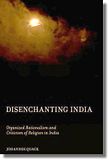Disenchanting India
Quack, Johannes:
Disenchanting India : Organized Rationalism and Criticism of Religion in India / Johannes Quack. - New York [u.a.] : Oxford Univ. Press, 2012. - XVII, 362 S. : Ill.
Hochschulschrift. Zugl.: Heidelberg, Univ., Diss., 2009
ISBN 978-0-19-981260-8
US$ 99,00 (Hardback)
ISBN 978-0-19-981262-2
US$ 39,95 (Paperback)
DDC: 211.40954
Beschreibung
India is frequently represented as the quintessential land of religion. Johannes Quack challenges this representation through an examination of the contemporary Indian rationalist movement, which affirms the values and attitudes of atheism, humanism, or free-thinking. Quack shows the rationalists' emphasis on maintaining links to atheism and materialism in ancient India and outlines their strong ties to the intellectual currents of modern European history. At the heart of Disenchanting India lies an ethnographic study of the organization "Andhashraddha Nirmulan Samiti" (Organization for the Eradication of Superstition), based in the Indian State of Maharashtra. Quack gives a nuanced account of the rationalists' specific "mode of unbelief," describing their efforts to encourage a scientific temper and combat beliefs and practices they regard as "superstitious". Quack also shows the role played by rationalism in their day-to-day lives, as well as the organization's controversial position within Indian society. Disenchanting Indiaprovides crucial insights into the nature of rationalism in the intellectual life and cultural politics of India. [Verlagsinformation]
Inhalt
Prologue. xi
Introduction. 3
PART I: OBJECT OF INQUIRY: INDIAN RATIONALISTS, MODES OF UNBELIEF & DISENCHANTMENT. 7
1. Indian Rationalists. 9
2. Modes of (Non-)Religiosity and Unbelief. 19
3. Rationalization and Disenchantment. 29
4. Methodological Remarks and Research Setting. 41
PART II: HISTORY: ROOTS OF ORGANIZED RATIONALISM IN INDIA. 47
5. ''Narrative'' of the Indian Roots of Rationalism. 49
6. Evolution of Rationalism in Colonial India. 57
7. Influence of the English Rationalist Movement. 69
8. Organized Rationalism in 20th Century India. 79
9. Recent History of Organized Rationalism in Maharashtra. 101
PART III: ETHNOGRAPHY: MAHARASHTRA ANDHASHRADDHA NIRMULAN SAMITI (ANiS). 107
10. ANiS in Action: The Science-Van. 109
11. Organizational Structure and Set-Up of ANiS. 145
12. Profile and Agenda of ANiS. 181
13. Individual Interpretations and Applications of Rationalism. 207
14. Rationalism as a Way of Life. 221
15. ANiS in Context. 245
16. Impact of ANiS. 267
PART IV THEORY: THE MODE OF UNBELIEF OF ANIS. 271
Epilogue: Disenchanting India Contextualized. 285
Empirical Question: A Transnational Rationalist Movement? 286
Theory: Disenchantment as Problematic Master-Narrative. 294
Metatheory: Prospective Reflections on "Researching Rationalism". 302
References. 313
Appendixes
1. Transliteration of Hindi and Marathi Terms. 335
2. Interviews and Documented Conversations. 336
3. Anti-Superstition Bill. 341
4. Original German Quotations. 350
Index. 355
Autor
JOHANNES QUACK studied Religious Studies, Philosophy, and Anthropology at the Universities of Bayreuth, Edinburgh, and Heidelberg. He was a Postdoctoral Fellow at the Cluster of Excellence "Asia & Europe," Heidelberg University and is currently research fellow at McGill University, Montreal. Profile page (Heidelberg).
Quellen: Oxford University Press (USA); WorldCat; Amazon; Google Books
Ähnlich
- Scriptural Authority, Reason and Action
- The Importance of Religion
- Yoga in Practice
- Die Relationalität des Subjektes im Kontext der Religionshermeneutik
- Two Truths in Bon
- Franco/Notake: Dharmakīrti on the Duality of the Object
- Moriyama: Omniscience and Religious Authority
- Sthiramati's Pañcaskandhakavibhāṣā
- Park: Vasubandhu, Śrīlāta, and the Sautrāntika Theory of Seeds
- Eltschinger: Buddhist Epistemology as Apologetics

